Information/Write-up
Mantis: A Brief but Ambitious Chapter in Canadian Progressive Rock
Formation and Early Years
Mantis emerged in 1971, a progressive rock band that combined orchestral elements, blues, and a touch of new wave experimentation. The band was founded by Rick Elger (guitar, keyboards, vocals) and Martin Swerdlow (bass, conductor), who met while living in a three-story apartment in Montreal. Swerdlow, a classically trained musician since the age of ten, introduced a more refined musical approach, blending rock with orchestral fusion.
The lineup was completed with the addition of Christine Williams (lead vocals), Philip Aker (guitar), Mark Bajona (drums), and Daniel Hutchinson (guitar, vocals). The band’s vision caught the attention of Bob Hahn and Brian Chater, who had worked extensively with Canadian rock acts and helped Mantis secure studio time.
The Recording Sessions at RCA Studios
In 1973, Mantis entered RCA Studios in Toronto to record what would become their only full-length album. Moe Koffman and Guido Basso, both highly respected musicians, were brought in to contribute orchestrated segments, with Swerdlow conducting the orchestra. The band's guitarist, Mark Bajona, then 19 years old, recalls auditioning at a Toronto club and, after passing the selection process, was flown to Montreal for rehearsals before returning to Toronto for recording.
The album featured standout tracks such as "Eyes of Fire" and "Fred", the latter of which was conceived during a spontaneous six-minute jam session. Bajona remembers Elger asking:
“What are we going to call that?”
Swerdlow jokingly replied, “Fred.” The name stuck.
The band performed at various Montreal venues, including The Moustache, and also had shows in Toronto. However, despite their efforts, progressive rock with orchestral influences was still ahead of its time, and radio stations struggled to categorize their sound.
Album Release and Industry Struggles
The self-titled debut album, Mantis, was released in December 1973 on Sweet Plum Records. While initial recordings wrapped up in November, the band had originally intended to include a cover of Suzi Quatro’s "Can The Can", but ultimately decided to focus on original material.
Unfortunately, A&M Records of Canada, which had shown interest in distributing the album, ultimately passed due to financial disagreements. Instead, A&M only handled distribution, providing minimal promotion. As a result, the album struggled to gain mainstream traction, and Mantis folded by early 1974.
Post-Mantis Careers
Mark Bajona moved away from progressive music and later joined The Start, contributing to the album Hey You. During this period, he adopted the stage name "Valdez" in honor of his late father, a dance instructor at Arthur Murray's dance studio. Today, he resides in Sault Ste. Marie, Ontario, and maintains a personal music website.
Martin Swerdlow returned to classical music, scoring for film and theatre, and recording ballet scores. He remains active in Montreal as a performer.
Christine Williams and Swerdlow continued to write together before going their separate ways. Williams later reflected:
“I have always been involved with music in one way or another—my whole life. The drug scene, being on the road, etc., I admit I didn’t have the ‘metal’ for the band life. But I love creating music—not so much the music business.”
Williams moved away from the industry, embracing a life of Tai Chi, environmental activism, and raising a family. She traveled extensively through Haiti, Africa, and Bangladesh, teaching Tai Chi, music, and theatre before settling in the Quebec countryside.
Rick Elger had various solo releases before forming a novelty act with a female vocalist/vaudeville-style tap dancer, playing ukulele. Later, he was rebranded as "Rick Blue", leading to the formation of Rick Blue & Sonic Stew in 1974. In 1978, he partnered with George Bowser, forming the Montreal-based comedy duo Bowser & Blue, which continues to perform today.
Legacy
Mantis was a band of ambition and experimentation, blending genres in a way that was ahead of its time. Though their sole album struggled commercially, it has since gained recognition as a rare and valuable collector’s item among fans of early progressive rock.
While the members went their separate ways, their contributions to Canadian music, theatre, and performance art continued long after the band’s dissolution. Mantis may not have been a household name, but their unique fusion of rock and orchestration left a lasting impression on those who heard them.
-Robert Williston
The album was uncredited, however Mark has confirmed the following lineup:
Rick Elger: vocals, harmonica
Christine Williams: vocals
Mark Bajona (The Start): guitars
Philip Aker: bass
Daniel Hutchison: drums
Martin Swerdlow: synthesizer, keyboards
Produced by Bill Hill
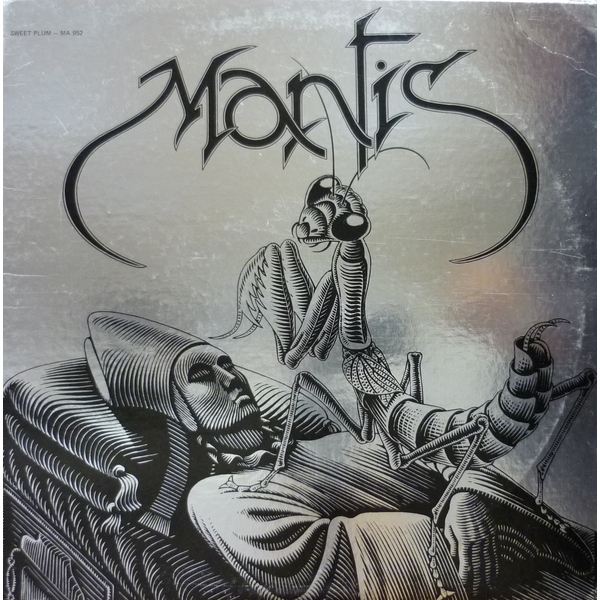
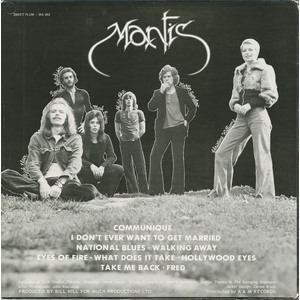
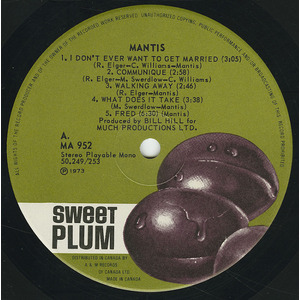
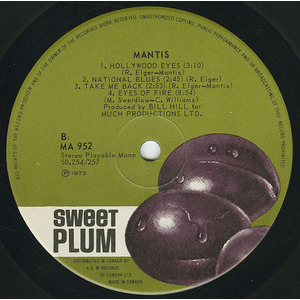
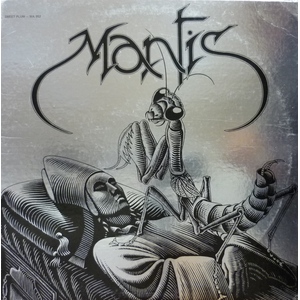
No Comments